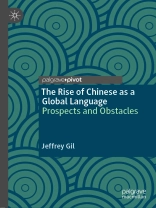This book investigates the macroacquisition of Chinese – its large-scale acquisition and adoption for various purposes by individuals, governments and organisations – and the implications of this process for the future of English as a global language. The author contextualises the macroacquisition of Chinese within the global ecology of languages, then analyses the factors responsible for the macroacquisition of Chinese, showing, in contrast to most academic and popular commentary, that a character-based writing system will not stop Chinese from becoming a global language. He then articulates three possible future scenarios: English remaining a dominant global language, English and Chinese both being global languages, and Chinese becoming a global language instead of English. The book concludes by outlining directions for further research on the acquisition and use of Chinese around the world. It will be of interest to students and scholars with an interest in English as a global language, Chinese as a second/foreign language, language education policy, and applied linguistics more generally.
Mục lục
Chapter 1 – Introduction: English and Chinese in Today’s Multilingual World.- Chapter 2 – Language Comprehensive Competitiveness: A Conceptual Framework for Investigating the Macroacquisition of Chinese.- Chapter 3 – The Language Comprehensive Competitiveness of Chinese: The Objective Perspective.- Chapter 4 – The Language Comprehensive Competitiveness of Chinese: The Subjective Perspective.- Chapter 5 – A Language Comprehensive Competitiveness Profile of Chinese.- Chapter 6: The Character-Based Writing System: An Obstacle to Becoming a Global Language or Not?.- Chapter 7 – English and Chinese in Tomorrow’s Multilingual World: Continuation, Co-existence or Replacement?.- Chapter 8 – Conclusion.
Giới thiệu về tác giả
Jeffrey Gil is a Senior Lecturer in ESOL/TESOL at Flinders University, Australia. He has also taught at universities in China. Jeffrey has published widely on applied linguistics topics and is the author of Soft Power and the Worldwide Promotion of Chinese Language Learning: The Confucius Institute Project (2017).












